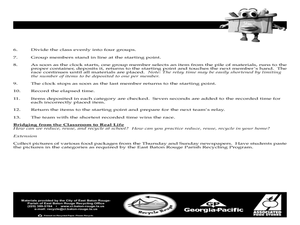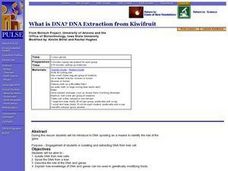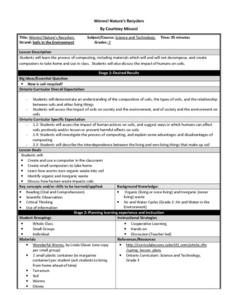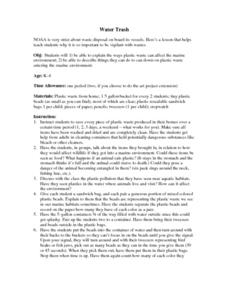Curated OER
All Wrapped Up
Students work in teams to identify and sort types of packaging used in food production. They consider ways to reduce the environmental impact of packaging and reflect how consumer choices play a role in trash production.
Curated OER
Preparing Fruits and Vegetables
Students discuss ways to properly clean fruit and vegetables. In this adult health lesson, students explain the benefits of eating fruits and vegetables. They suggest ways to store food for future use.
Curated OER
Dunk It! Don't Junk It!
Third graders explore the concept of sorting recyclables. In this recycling instructional activity, 3rd graders determine how to separate recyclables from waste and how to sort recyclables into different categories.
Curated OER
Clues From the Past: Daily Life
Students discover the ways different cultures gathered and made food. In groups, they read excerpts from primary sources about the food people in Mesopotamia liked to eat. They work together to make a batch of goat stew and a loaf of bread.
Curated OER
What is DNA? DNA Extraction from Kiwifruit
Students isolate DNA from kiwi cells, spool DNA from a kiwi, describe role of the DNA and genes, and explain how knowledge of DNA and genes can be used in genetically modifying foods.
Curated OER
Why Should I Waste My Time Separating Garbage?
Students discuss the differences in the types of garbage. They use these differences to separate a sample of garbage. Partners then investigate the characteristics of landfills by searching on the Internet and by creating your own...
Curated OER
To Rot or Not!
Students discover that composting helps reduce landfill waste and is good for the soil. They explore the techniques of composting through a variety of media, art activities and hands-on experience.
Curated OER
Worms, Nature's Recyclers!
Students study what worms need to survive in different environments. They study how worm composting improves soil and reduce waste. They discuss composting techniques and present a puppet show about a worm's life.
Curated OER
Can You Count on Cans?
How can a canned food drive be connected to math? It's as simple as counting and organizing the cans! Children demonstrate their ability to sort non-perishable foods into categories that include soup cans, vegetable cans, boxed items,...
Curated OER
Compost Lesson
If you are looking for how to introduce elementary environmentalists to the process of composting, here is a comprehensive outline for making it happen. The plan is to set this up at the beginning of a school year in order to observe the...
Education Outside
Natural Dye Tie-Dye
Up-cycle, or reprocess waste materials, into colorful tie-dye clothing or banners with an activity that uses fruits and vegetable juices as dye sources.
Biology Junction
Enzymes
Many people know enzymes help with digestion, but few realize enzyme production decreases with age, making it more difficult for bodies to digest certain foods. A worksheet offers 28 fill-in-the-blank and short-answer questions over...
Curated OER
Recycling
In this recycling worksheet, high schoolers review what items can be recycled, what is made from recycled items, and how recycling conserves resources. This worksheet has 5 word scramble, 10 short answer, and 5 multiple choice questions.
Curated OER
Needs and Wants
Students demonstrate responsible consumer choices. In this social studies lesson, students read The Lorax and discuss wants and needs. Students discuss how to save natural resources by making informed consumer choices.
Curated OER
Debris Dilemmas
Students examine debris, what it is, where it comes from and where they go. In this debris lesson students view a video, answer questions and discuss what they learned.
Curated OER
Ecosystems
Students work in small groups to create a poster illustrating the flow of energy through a typical ecosystem, then present their posters to the class.
Curated OER
What a Waste
Pupils analyze components of garbage. They collect and sort a few days' worth of garbage. They chart the results of an investigation.
Curated OER
Feed Me!
In this following directions worksheet students are given a worksheet with 25 pieces of trash. They then have to follow the directions of underlining, coloring, circling, and drawing the items that are described.
Salt River Project
How Do We Clean Polluted Water?
How do we clean up oil spills and other pollutants in the water? Explore water treatment strategies with a set of environmental science experiments. Groups remove oil from water, work with wastewater treatment, and perform a water...
Beyond Benign
Ecological Footprint
How does your lifestyle measure up in terms of your ecological footprint? Young ecologists examine their impact on the planet using an insightful online calculator. A short quiz asks users to rank the size of their homes, their energy...
Curated OER
What's Organic?
Young scholars discuss background information presented by the teacher and read dictionary definitions for the words "organic" and "synthetic." In this gardengin lesson, students complete a worksheet on the material. Young scholars grow...
Virginia Department of Education
The Effects of Heat and Acid on the Enzyme Catalase
How quickly do enzymatic reactions occur? Assist the class as they examine heat and pH change to determine the rate of chemical reactions using catalase as an enzyme. Watch them "glow" with excitement!
Curated OER
Water Trash
Pupils examine how plastic waste affects the marine environment. They describe techniques that reduce plastic waste in this environment after examining plastic waste that accumulates in their own homes.
Curated OER
What's For Lunch? (Digestive System)
Students identify components of the digestive system and explain functions. They create and label a diagram of the digestive system. They watch the video "Passage of Food" and perform a proper dissection of a frog. They create a flow map...
Other popular searches
- Science Project Food Waste
- Recycling Food Waste
- Food Waste Decomposers
- School Food Waste
- Food Waste Decompose Rs

























